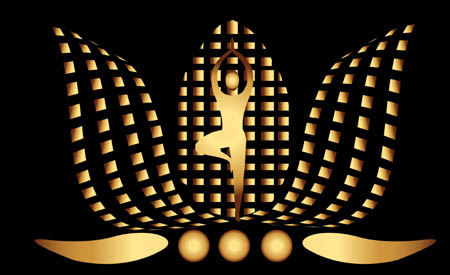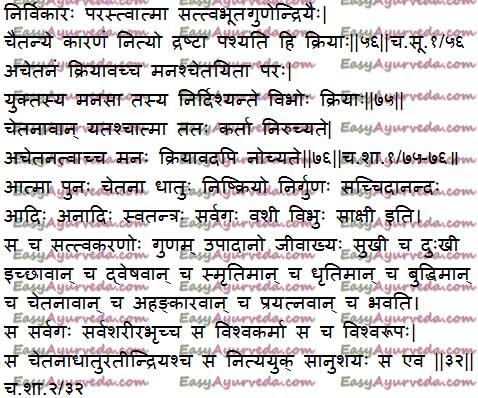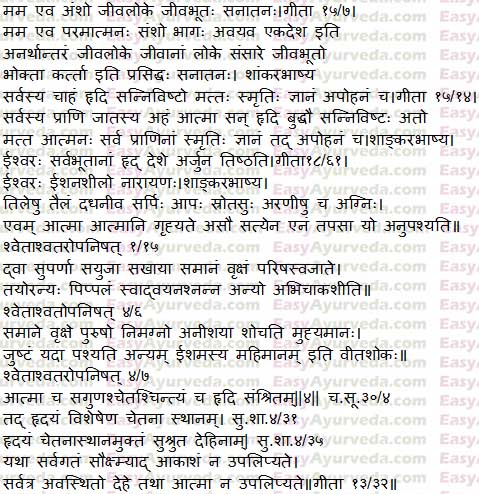Paramatma – The Greater Soul: Difference Between Jivatma And Ishwara
By Dr Raghuram Y.S. MD (Ay) & Dr Manasa, B.A.M.S
Atma means soul. Atma is said to be of two forms. They are –
- Paramatma – the universal supreme soul
- Jivatma – individual soul, a derivative of the greater soul
Read – Purusha: Definition, Types, Characteristic Features
Table of Contents
Introduction

Paramatma –
Parama = supreme
Atma = soul
Paramatm is said to be the soul which is responsible for the creation of the entire universe. Paramatma is often used as synonym to God.
Each individual soul is a component of the supreme soul. Universal supreme soul gives rise to every individual soul which is responsible for life.
Read – Relieving Negative Feelings With Self Awareness – Case Study
Features of greater soul
Nirvikara – The soul is devoid of any deformities and is not afflicted by any disease.
Para – means most important. The soul is subtle, minute, invisible and not perceived. It is the most important and supreme entity because there is no life without the soul. Para also means ‘that which is different from the mind and body’. This word is used to give a special identity to the soul. The term atma at times is grossly used to describe the living body. The word para has been used to show that the soul is a different entity apart from body and mind and also to show the supremacy of soul over body, mind and senses or derivatives of the causal nature.
Read – Paratva Aparatva Gunas – Meaning, Benefits
Sattva bhuta guna indriyaih chaitanye karanam – The soul becomes responsible for manifestation of life only when it gets associated with the mind, qualities of the elements and the sense organs. Chaitanya i.e. manifestation of life is present only in the soul.
Nitya – Nitya means eternal. The soul is eternal. Even when the body is destroyed following death of the person, the soul doesn’t get destroyed. Drashta pashyati hi kriyah – The soul is said to be a spectator. He doesn’t participate in any activities but keeps observing all the life activities carried out by the physical body, mind and senses just as a spectator sees an act. He only gets the experiences of these activities.
Read – Mind – Qualities, Functions, Doshas As Per Ayurveda
Sanskrit verse


Charaka’s opinion
Consciousness of soul as explained by master Charaka
The mind is devoid of consciousness but it is active. The soul has consciousness and imparts life but is not actively indulged in the activities of life. The soul appears to be indulged in activities due to the activities of mind located in it. Due to the absence of consciousness and inability to impart life, the mind, in spite of being indulged in activities is not called as kartaa i.e. ‘the doer’. The soul in spite of not getting indulged into the activities of the life is called ‘the doer’ because of having consciousness and for being able to influence the life activities in its presence, as a spectator. The knowledge and consciousness are related to the soul and not the mind and body.
Read – Stop Complaining And Increase Happiness In Life
Jeevatma connection
Relationship between the Supreme soul and Individual soul
The greater soul is also called as Chetana dhatu i.e. a conscious being as it represents life. He is characterized by being –
- Nishkriya – inactive
- Nirguna – devoid of three major qualities i.e. sattva, raja and tama
- Sat – true
- Chit – conscious
- Ananda – bliss
- Aadi – origin
- Anadi – nothing exists before the soul
- Swatantra – independent
- Sarvagah – all pervading
- Vashi – the controller
- Vibhu – omnipresent
- Sakshi – witness
When this supreme soul gets associated with the qualities of mind and other faculties (senses etc) he is called as individual soul. This soul exhibits happiness, grief, desire, hatred, memory, courage, intelligence, consciousness, egoism and efforts.
Read – Importance Of Soul In Perception Of Knowledge: Atma Jnana
Also, the soul has below mentioned characters –
Sarvaga – Since the soul is associated with karma i.e. the deeds done in previous birth, he is said to be all pervading, in all timelines.
Sarva sharirabrt – Soul adorns all forms of bodies including human, Gods etc.
Vishvakarma – Soul is responsible for the creation of the entire universe and governs all activities therein.
Vishvarupa – Soul takes the form of entire creation – everything is embedded in the soul.
Chetana dhatu – Soul is a form of self-manifested consciousness.
Atindriya – Soul is beyond the territories of senses – not perceivable to the senses.
Nityayuk – Soul is always engaged and associated with all activities. It indulges the mind with various activities.
Sanushayah – Soul is affected by the remainder of the consequences of actions which bring the soul back to the earth, in the form of reincarnation.
Relationship between Ishwara, Paramatma and Jeevatma
The terms like Ishwara, Paramatma, Jivatma, Parameshwara, Brahma and Parabrahma are described in the theory of creation of the universe in Ayurveda and other philosophical treatises. These terms are used as synonyms. But the contextual use of these terms might differentiate their meanings from one another.
Read – Sufferings And Health Of Spiritual People – Ayurvedic Analysis
Relationship between Ishwara, Paramatma, Jivatma and Brahma
Ishwara generally used to describe God who is responsible for creation of the universe.
Parama Ishwara, here the prefix ‘parama’ explains Ishwara as the ultimate power behind all activities in the creation.
Brahma too is used as synonymous to Ishwara. Brahma is one among the divine trinity called Trideva, the other two being Lord Shiva and Lord Vishnu. The three together are said to create (Brahma), operate (Vishnu) and destroy (Shiva) the universe.
Therefore the divine trinity resembles three phases of creation and also explains that everything which is created runs through a phase of living and eventually gets destroyed. The word Brahma may envelope the entire trinity since creation is a balance between being created and destroyed. Parabrahma, means Brahma who is ever significant and ultimate.
Read – Mental And Spiritual Benefits Of Fasting
Atma means soul. It is a life principle which keeps the life activities going.
Paramatma = Parama + Atma. Parama Atma also explains ‘the all important and ultimate’ soul responsible for all creation. This is the greater soul.
Jivatma is the individual soul present in each of us. All individual souls take their origin from the greater soul. When an individual dies, all individual souls will consequentially get back and unify with the greater soul from which they are derived.
Read – Lord Dhanwantari ‘The God of Ayurveda’
‘Jivatma is a part of me’ – tells the God, the greater soul claims all individual souls
According to a reference from Bhagavad Gita, the greater soul / God claims that every life existing in the world he has created is an essential part of him. ‘Everyone who is experiencing the life in the created world, in the world of mortals is a portion of me’ he says.
Further the greater soul claims –
‘I, being the soul of all living beings am located in their heart and consciousness. Thus I alone am responsible for the manifestation, presence and absence of memory, reasoning power and knowledge’
Lord Krishna tells Arjuna – ‘Hey Arjuna, the Ishwara i.e. the one who has the capacity to rule everything, Lord Narayana, resides in the heart of all living beings’.
Read – Depression Causes, Ayurvedic Treatment, Tips And Remedies
Individual souls are portions of Paramatma and Ishwara. Thus, Paramatma = Atma = Ishwara = Parama Ishwara = Greater soul. Therefore Paramatma and Ishwara are synonymous.
The greater soul and individual soul have an inseparable relationship. The individual soul is attached and the greater soul is detached from everything. The greater soul is devoid of any experiences related to the fruits of action whereas the lesser soul being in close association with the physical body experiences the fruits of all the actions.
Read – Moksha – The Ultimate Spiritual Liberation
The individual soul lives in our heart and is invisible
Just as the oil in sesame seeds, ghee in the curds, water in the tubes and fire in the wood, the ultimate soul, the God is also located in the heart of all living beings in an invisible form. One can know and perceive him only by performing penance and living a righteous life.
Read – Dharma – To Follow The Right Of Life
The greater and individual souls are the two companion birds living together on the same tree called nature
One bird eats the fruits of that tree and the other bird lives on it being a silent spectator, without tasting the fruits. The bird which eats the fruit is said to be the individual soul, who experiences the fruits of the deeds done by the body with which he is connected. The bird which doesn’t eat the fruit and stays as a silent spectator is said to be the greater soul. The tree is the gross nature. Being related to the nature, the greater and individual soul, both do not have beginning or end.
The greater and individual souls are related inseparably and therefore called as sayuja i.e. ‘closely united companions’.
Read – Artha – Pursuit For Ethical Earning, Money, Wealth
The individual soul is jammed between the nature (creation) and greater soul
The individual soul is said to be interposed between the nature and greater soul. On one side of the individual soul, there is the nature and on the other side is the greater soul. When the individual soul is associated with the nature, it is entangled in the attachments. When it is associated with the greater soul, the individual soul attains spiritual liberty and gets salvation. Therefore the individual soul is stuck between attachments and liberty.
The individual soul is gets attached easily to the nature which doesn’t have any origin like himself. He gets attracted to the materialistic satisfactions and develops a dependency on the objects therein due to ignorance. As a result he gets immersed in grief and disappointment. This happens until the individual soul realizes his importance and also the importance of him being associated with the greater soul. This is the beginning point of spiritual journey and liberation. When the individual soul realize the ultimate power of the greater soul he gets liberated from grief and disappointments.
Read – Pravritti – Attachment, Meaning, Causes, Effects of Attachment
When the individual soul gets deeply involved in the materialistic world and forgets the importance of self, he starts identifying himself with the physical body. Since he thinks that he is the body, he becomes possessive about the body. He starts feeling in grief when the body is put into pain and troubles. He starts thinking ‘I am weak / suffering’. But when he focuses upon the greater soul spread out within him and identifies himself in association with the greater soul, he slowly gets detached from the worldly affairs of the materialistic world. He now starts realizing that he is not the same as the body with which he is associated, the sufferings of the body are not his sufferings, he is different from the body and his bliss, freedom and liberty lay in the greater soul from whom he is derived.
Read – Treatment For Excess Desires – Naishtiki Chikitsa
Therefore the grief experienced by the individual soul is due to attachment and ignorance. The happiness, bliss and freedom that the individual soul experiences is due to his detachment from the worldly pleasures, identifying himself as different from the physical body and his oneness and inseparable relationship with the greater soul.
This greater soul, the God is located in the heart of all individuals. This doesn’t mean that the soul is not related to the other parts of the body, he is. Since the heart is the best organ among all and since it controls all the activities in the body, it is said to be the seat of soul. We also need to remember that the soul is just a spectator of all activities and he doesn’t get involved in doing any deeds.
Read – Main Cause For Diseases As Per Ayurveda
Ayurveda too has accepted heart as the seat of the soul
Mater Charaka tells – ‘The soul embedded with its own qualities like desire, hatred etc, the mind and the subjects of mind like thinking etc, all these are located in the heart’.
Master Sushruta tells – ‘The heart, specifically is the seat of soul’. This explanation clarifies that the soul is also located at all places and organs of the body i.e. entire body, but is specifically located in the heart.
The individual soul is not attached with the qualities, deeds and the defects of the physical body
The soul is just a spectator of all the actions and deeds of the physical body and he experiences the fruits of those deeds without actually getting indulged into the activities and affairs of the body.
A reference from Bhagawad Gita tells – ‘Just like the sky is all pervading and yet is not attached to anything due to its subtle nature, the soul too, in spite of being associated with the entire body will not get indulged and is not attached with the qualities, deeds, good and bad actions and defects of the body’.
Click to Consult Dr Raghuram Y.S. MD (Ayu) – Email / Skype









